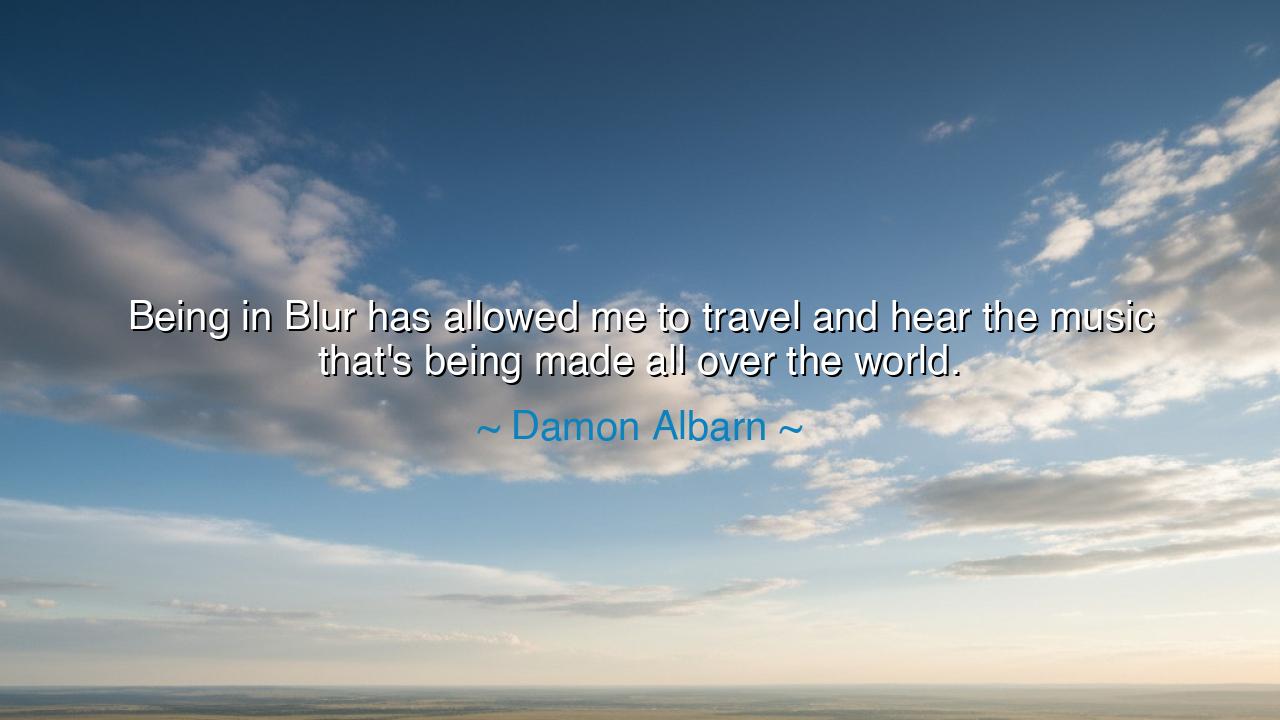
Being in Blur has allowed me to travel and hear the music that's
Being in Blur has allowed me to travel and hear the music that's being made all over the world.






"Being in Blur has allowed me to travel and hear the music that's being made all over the world." Thus spoke Damon Albarn, singer, poet, wanderer of sound. His words are not only about the fortune of fame or the gift of travel, but about the sacred privilege of encountering the living heartbeat of humanity through music. In them we hear the gratitude of one who has crossed oceans and borders, and in each land has discovered a new rhythm, a new voice, a new revelation of the soul of mankind.
The ancients would have understood this wisdom. They believed that each people, each tribe, had its own song, its own music that rose from the soil, the rivers, and the spirits of the land. The Hebrews sang psalms to their God, the Greeks lifted hymns to Apollo, the Celts played their harps in wild forests. To travel, for them, was not merely to see new places, but to hear new songs. And Albarn, in his modern way, walks the same path as those ancient seekers, listening to the echoes of humanity as it sings in countless tongues.
For what is music, if not the truest voice of a people? Politics may divide, language may confuse, but music speaks directly to the heart. When Albarn says he has "heard the music being made all over the world," he speaks of touching the essence of many nations, of entering into communion with strangers through sound. It is the kind of knowledge no book can give, the kind of intimacy no map can chart. To hear another’s music is to glimpse their soul.
History provides its own testimony. Consider the voyages of Béla Bartók, who wandered through villages of Eastern Europe collecting folk songs before they disappeared. He understood that in the humble songs of peasants lay the spirit of entire cultures. Or recall Paul Simon, who drew upon the harmonies of South African musicians to create Graceland, blending voices across continents. Like Albarn, these men discovered that travel and music together reveal the deep unity of humankind.
There is humility in Albarn’s words, too. He does not boast of creating music alone, but of listening. "To hear the music that’s being made," he says—he places himself as a student before the world. The true artist is not only a maker but a listener, one who bows before the greatness of others’ creativity. In this humility lies wisdom: for those who travel and only impose themselves learn little, but those who travel and listen gain treasures beyond measure.
O children of tomorrow, take this teaching to heart: if you wish to know the world, listen to its music. Do not hurry through your journeys only with your eyes; open your ears. In the songs of fishermen, in the chants of workers, in the hymns of temples, in the cries of street musicians, there lives the essence of the people. To hear their music is to honor their humanity.
Therefore, live as Albarn teaches. Seek the world not only for its sights but for its sounds. Travel if you can; if you cannot, let the songs of other nations find you where you are. Listen with reverence, and let the music of others shape your heart. For in hearing, you will learn compassion; in listening, you will discover kinship; and in the harmony of many voices, you will find the unity of all mankind.
Thus the saying of Damon Albarn endures: travel and hear the music of the world. For in music there are no borders, only bridges. And the one who listens becomes greater than himself—he becomes part of the eternal song that binds all people, all lands, all generations together.






AAdministratorAdministrator
Welcome, honored guests. Please leave a comment, we will respond soon